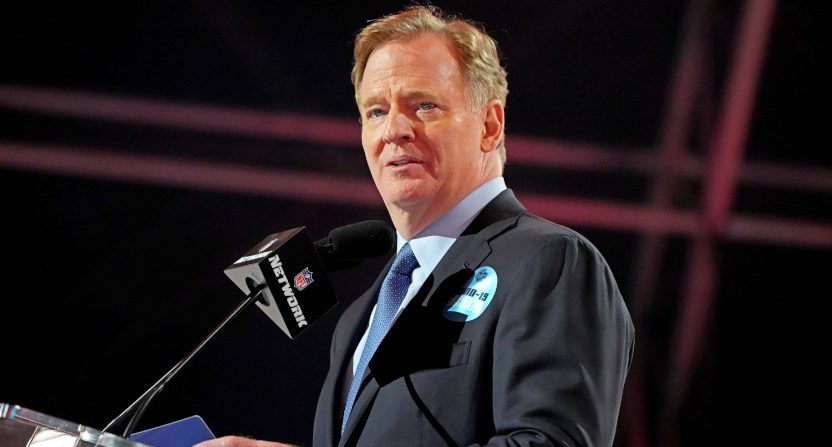Since 2015, there’s been a lawsuit against the NFL over the Sunday Ticket package working its way through the courts. (The current lawsuit is actually the result of a 2016 consolidation of 27 different lawsuits.) It was tossed by a California court in 2017, but that ruling was overturned by the Ninth Circuit in 2019; plaintiffs then sought class certification, which was granted early last year, with a trial date set for February 2024. And now, as we’re approaching the Feb. 22 trial date, the sides filed their witness lists Friday, with NFL commissioner Roger Goodell, Dallas Cowboys owner Jerry Jones, and New England Patriots owner Robert Kraft among the notable inclusions there.
We’ve been covering this lawsuit since its 2015 beginnings, and there are plenty of interesting angles to it. The plaintiffs (currently in two classes: an estimated 2.4 million residential subscribers who bought Sunday Ticket from DirecTV after 2011, and an estimated 48,000 businesses who did the same) are arguing that the Sunday Ticket setup is an antitrust violation. Some of their arguments there are on how it prevents teams from selling their rights individually in other teams’ markets, in how it requires purchase of the entire out-of-market package, not single-team or single game options, and in how it’s only offered through a single multichannel video provider (DirecTV then for individuals and businesses, DirecTV now for businesses, and YouTube TV now for individuals).
The other key piece of this is where these games are broadcast. Part of the NFL’s defense has been that they can sell games collectively without antitrust issues thanks to the 1961 Sports Broadcasting Act, which they lobbied heavily for. But in the 2019 court reinstatement, the Ninth Circuit ruled 2-1 that that act’s “sponsored telecasting” discussion is specifically about ad-supported broadcasts on over-the-air TV, and doesn’t exempt deals with cable or satellite broadcasters from antitrust scrutiny. That’s now led to this case getting close to trial, and to witness lists featuring many powerful NFL owners and executives. Here’s more on that from Michael McCann, Daniel Libit, and Eben Novy-Williams at Sportico:
The plaintiffs say they will call Jones, a member of the league’s broadcast and media committees, to testify about “the rights of NFL teams to license game broadcasts and trademarks and the distribution of out-of-market games on television.” Another member of those committees, Kraft, will similarly be expected to discuss the “the exclusive distribution arrangement of Sunday Ticket in the United States and the packages offered through Sunday Ticket.”
The NFL intends to question Goodell about, among other topics, the distribution of NFL games and the league’s contractual arrangements with broadcasting partners. He would also discuss the relationship between the league itself and teams, and how that shapes their broadcasting arrangements. Other listed league witnesses include CBS Sports chair Sean McManus and Fox Sports executive VP Lawrence Jones, with Kraft and Jerry Jones listed as possible defense witnesses.
Beyond those figures, much of the court time is expected to deal with expert testimony from economists. That will include University of San Francisco professor Daniel Rascher testifying for the plaintiffs and Stanford professor Douglas Bernheim testifying for the defendants. The plaintiffs also expect to call former NFL/ESPN/NFL Network executive Steve Bornstein, now the North American president of Genius Sports, to testify about “the popularity of NFL game telecasts, the creation and distribution of NFL RedZone, and league policies regarding game broadcasts.”
It’s possible a settlement will be reached before Feb. 22 and this won’t actually play out in court. It’s notable that similar lawsuits last decade about out-of-market packages from MLB and the NHL ended in settlements, with both of those leagues (and also the NBA) eventually offering single-team packages as a result. And there may be logic for the NFL to settle rather than have its executives and owners testifying about the ins and outs of its broadcasting deals in court. Also, a verdict against the league could cause problems for their current and future broadcast deals.
But there are definitely costs to settlements too. And court records project damages of $6.1 billion if this lawsuit is successful, so it will not be cheap to make it go away. We’ll see how this plays out and if these NFL figures do wind up testifying.







